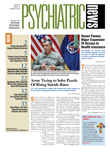People with psychiatric symptoms arriving at hospital emergency departments must have both a physical as well as a mental evaluation, but controversy remains about how much of the former is enough.
Psychiatrists are skittish about taking responsibility for patients before they are “medically cleared.” They and other physicians working in the emergency department (ED) often order a number of laboratory or imaging tests to rule in or out a variety of metabolic, neurologic, cardiovascular, or substance-use problems so they can settle primary diagnostic or treatment questions and decide where to eventually place the patient.
Guidance from professional associations depends upon which specialty is consulted. The American College of Emergency Physicians' policy on diagnosis and management of adult psychiatric patients in the ED says routine testing of all adult patients yields little information that can't be obtained by history and physical examination. (More information is posted at <
http://www.acep.org/WorkArea/DownloadAsset.aspx?id=8826>.)
In contrast, the APA practice guideline “Psychiatric Evaluation of Adults, Second Edition,” states that the psychiatrist may need to request an additional general medical evaluation to address diagnostic concerns that arise from the psychiatric evaluation and notes: “Psychiatrists and emergency physicians sometimes have different viewpoints on the utility of laboratory screening for substance use or medical disorders in psychiatric emergency department patients.”
There are two reasons to evaluate the medical status of patients brought to the ED for presumably psychiatric reasons: to find out whether the apparent psychiatric illness is due to a physical illness or whether any medical/physical symptoms are incidental to psychiatric illness, said Leslie Zun, M.D., professor and chair of the Department of Emergency Medicine at Chicago Medical School and chair of the Department of Emergency Medicine at Mount Sinai Hospital. He spoke to an overflow audience at APA's Institute on Psychiatric Services in October in New York.
“Did they run out of insulin or are they too psychotic to fill the syringe?” he said, summing up the problem.
The controversy arises over whether a battery of tests is needed for every incoming patient with psychiatric symptoms.
Evidence for and against universal testing varies. One literature survey found the prevalence of physical illness ranged from 15 percent to 80 percent, while another found that 46 percent of patients admitted to an inpatient psychiatric facility had some unrecognized medical illness, said Zun.
Other studies concluded that patients with primary, isolated psychiatric complaints and a past psychiatric history “do not need ancillary testing in the ED,” he said.
Another study of 352 psychiatric patients included 19 percent who had some physical illness, but nearly all could be accurately determined by history or physical examination. CBC and other laboratory tests had much less utility, he said.
Whatever individual studies report, the use of laboratory tests persists. Zun would prefer a more flexible approach.
“Instead of routine testing, examine the patient,” he said. “Will adding a drug screen change how you treat patients, or can you pretty much use the information the patient gives you?”
Zun applies a rule of thumb in the ED: If the patient is over 45, has a history of prior medical problems, and has abnormal vital signs and physical findings, then the doctor is probably looking at a physical case. However, patients with cognitive deficits, focal neurologic findings, and new (or different) psychiatric complaints are likely psychiatric cases.
“Testing doesn't help that much,” said Zun. CBCs or electrolytes don't affect outcomes, while drug and alcohol testing may be redundant.
“Most drugs or their metabolites stay in the system one to three days after ingestion, but may not affect behavior then,” he said. “If the patient is alert, awake, and cooperative, a screen isn't needed. Cognitive ability, not blood alcohol tests, is the best indicator.”
Zun prefers short tests of cognitive status like the clock-drawing test or the Brief Mental Status Exam, either of which can be administered in under two minutes. The Mini-Mental State Exam is also useful, although it takes five to 10 minutes to administer.
The walk-a-straight-line test is sufficient to reveal the extent of intoxication. Most people who state that they recently used drugs or alcohol test positive for the substances they report using, indicating that laboratory drug screens were likely to be redundant. However, if a patient appears impaired and wants to leave the hospital and drive home against medical advice, a screening test (or a call to security) is advisable for both liability and safety reasons.
One starting point for evaluating patients is a protocol developed by Zun, former APA President Nada Stotland, M.D., and others in Illinois.
ED physicians should determine if the patient has a new psychiatric condition, if there is a history of active physical illness needing evaluation, if vital signs are abnormal, if physical exam produces abnormal findings, or if any abnormal mental status indicates physical illness. Answering “yes” to any of the above calls for further evaluation.
“Testing is rarely indicated for patients with known psychiatric illness, but is appropriate for patients with new onset,” said Zun.
There may be a negotiated solution to the question of testing that both camps can live with, said Zun. One researcher has suggested simply dropping the term “medically clear” altogether and replacing it with a discharge note documenting the history, physical examination, mental status, neurologic exam, any laboratory results, discharge instructions, and follow-up plans.

